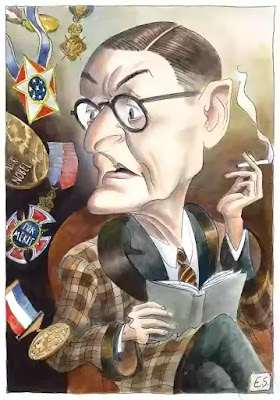Also Read
Eliot's fame as a dramatist rests on five plays:
(1) Murder in the Cathedral (2) The Family Reunion (3) The Cocktail Party (4) Confidential Clerk (5) The Elder Statesman
T. S. Eliot aimed at reviving poetic drama by writing these plays. His writing considerably influenced the course of modern English drama.
Significance of Eliot's plays:-
Eliot's plays must be examined against the light of his intention which was to bring poetic drama back to the modern age. Conscious of his weaknesses, he constantly strove to overcome them in successive plays. He faithfully kept up the exploration and experimentation that he said was necessary in achieving greater approximation to the unattainable ideal" of poetic drama. The plays are the practical applications of his theory of poetic drama and in each, one can observe his technical skill as a poet. They are in a way, a continuation of his poetry; his attempts to carry to a larger and wider audience, the themes of his poetry.
Development of Eliot's Dramatic Genius:-
Eliot was capable of viewing his last piece of work with critical detachment and taking up the next work with the intention of avoiding the mistakes he had made in the earlier one. There is a clear evolution in his work from Murder in the Cathedral to The Elder Statesmen. Technically each play is an improvement on the former.
The subject of Murder in the Cathedral was from the early history of England. Problems of versification and language were solved by the choice of a neutral style. But the solution was special to this play because verse was easily acceptable in a play whose subject was historical. If poetic drama were to stand on its own against prose drama, he realized that the subjects chosen should be from contemporary life, and that there should be a flexibility in the verse.
The four plays that followed had contemporary settings and were more or less in verse throughout. The Family Reunion suffered from a lengthy exposition; "a chorus of obtuse aunts and uncles, an odd appearance of the furies and an ambiguous kind of ending in that one is not clear whether to consider the play as the tragedy of the mother, or the salvation of the son." He avoids drawbacks in The Cocktail Party, where exposition is short and there is no use of the supernatural or the chorus. Each of his plays mark a definite step forward, overcoming earlier errors, and showing "a miraculous development in craftsmanship".
Diction and Versification:-
Aware that the earlier attempts of authors at poetic drama had failed because of their lifeless imitations of Elizabethan blank verse, Eliot turned to an earlier model that of Everyman. But his aim was to forge a new form suitable for his plays. He managed to develop a flexible verse form from contemporary idiom which would serve all his purposes.
Weakness in Characterization:-
He achieved remarkable success in his language and versification. But he has not done equally well in his characterization. His characters are seldom, individualized. Usually, they are sophisticated or aristocratic by birth or association. Their insights are often of a remote and unfamiliar kind, too profound and complex to allow for an easy appreciation of the plays. Eliot's characters lack reality and are "agents manipulated to make real some spiritual experience".
Plot:-
All his plays have in common a preoccupation with the nature of sainthood and the ability of a saint's death to benefit the life of others. This is, of course, most obvious in Murder in the Cathedral. All the plays have a kind of double pattern. On one level, they entertain; on the other hand they provoke thought on a higher plane. Eliot's plays embody his tragic sense of life which comes from the awareness of the mystery and inevitability of suffering. The human condition implies suffering. In his plays there are characters who exist on different level of consciousness. The choice they make in a certain situation reveals their character and the level of consciousness they have achieved. Thomas in Murder in the Cathedral is at the top of the scale in spiritual awareness and he chooses martyrdom. The element of tragedy in all his plays comes from the awareness that Man is imperfect, and that he suffers owing to the original sin. Traditional dramatic categories cannot be applied to Eliot's plays. They cannot be termed either as tragedies or as comedies. A.G. George calls them "existential plays".
Drawbacks:-
The fault most often found in his play is that his characters are not individuals and thus lack reality. The thought expressed is too often subtle and complex for easy understanding. The dialogues sound too unnatural and artificial. Another criticism is against the inclusion of artificial on supernatural elements such as the Furies and the spiritual guardians Julia and Alec. The sudden switch from a light sense of social comedy to serious and intense philosophical dialogue is somewhat disconcerting. These are the various criticisms made against Eliot's plays. The experience presented in the play is also said to be too remote from ordinary life, to make effective drama.
Conclusion:-
Eliot's achievement and greatness cannot be diminished in the light of the criticism leveled against him. The work he has done in versification alone entitles him to fame. At his highest moments he achieves that fusion of drama and poetry which he advocated. The speech of the Chorus in Murder in the Cathedral is one clear example of such a fusion. Technically, Eliot achieved a great deal with his power of phrasing and the careful use of words. His plays are, undoubtedly, great literature and as such are assured of a permanent place in dramatic literature.
